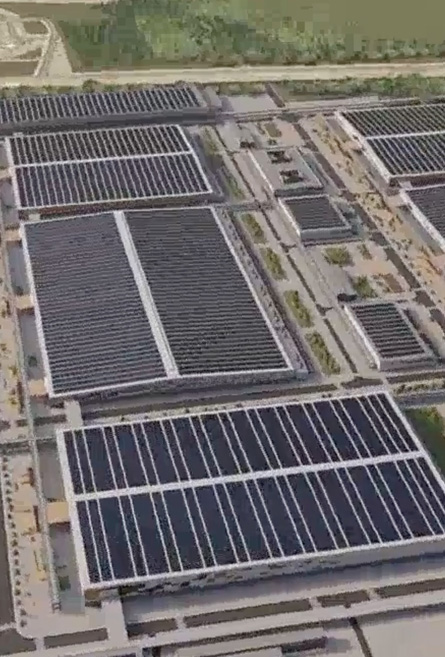
Guided by the philosophy of ‘We Care’, Reliance embraces the evolving landscape of climate-related disclosures, recognising that it extends beyond mere corporate obligations. The Company has reported in line with the Task Force on Climate-Related Financial Disclosures (TCFD) recommendations, which are now embedded into the broader framework of IFRS S2 Climate-related Disclosures under the ISSB Standards.
These disclosures reflect the Company’s commitment to transparency and proactive management of climate-related risks and opportunities as it progresses towards its Net Carbon Zero objective by 2035.
Governance
Reliance is actively progressing towards better integration of climate change considerations into both strategic and operational decision-making processes. The Company’s Board is responsible for overseeing, reviewing and guiding activities related to its energy transition strategy through regular engagement with the management and external specialists.
The Board is supported by the ESG Committee in reviewing and identifying current or emerging climate risks and opportunities; assessing their effects on business and various stakeholders; and proposing actions or strategies to adapt to the evolving environment, mitigate risks or capitalise opportunities. The Board also oversees the Company’s overall risk management and internal control mechanisms through various committees.
Details on the Terms of Reference of the ESG Committee can be accessed on the Company’s website: https://www.ril.com/OurCompany/ Leadership/BoardCommittees.aspx.
The ESG Committee convenes quarterly to review the Company’s sustainability initiatives, progress made, advancements towards goals and targets, and upcoming plans. A comprehensive overview of the Committee proceedings is reported back to the Board.
Additionally, the New Energy Council (NEC), comprising global advocates and thought leaders in the New Energy sector, regularly provides inputs to the Board about the Indian and global energy transition landscape. It also validates Reliance’s New Energy strategy, roadmap and risk mitigation plans that are essential for achieving the Company’s ambitious Net Carbon Zero target.
As the world ushers in the era of low-carbon energy, appropriate skills and capabilities are important for solving the complex problems posed by the associated transition. The Board contributes essential expertise spanning various domains, encompassing operations, risk management, strategic planning and regulatory challenges to address climate-related issues. For more details on the Board’s areas of expertise, refer to our Corporate Governance Report on page 62. Whenever pertinent, the Board organises sessions to augment members’ comprehension of the latest regulatory requirements, best practices and their implications for the Company.
Guided by a capable Board, the Company’s management assumes a pivotal role in evaluating and handling climate-related risks and opportunities, as well as tracking the advancement of climate change goals. Specialised teams reporting to the Executive Committee address matters concerning decarbonisation, the New Energy business and associated plans. The Executive Committee exercises oversight over strategic decisions and the portfolio of initiatives, aligning them with the Company’s Net Carbon Zero objectives. The management consistently informs the Board about climate-related metrics, existing and potential risks, opportunities in energy transition, outcomes of related initiatives, partnerships and disclosure practices.
Risk Management
Reliance recognises the challenges and opportunities arising from energy transition and its potential impacts on its business, strategy and financial planning across short, medium and long-term horizons. The transition to renewables provides the Company with an opportunity for continuous hyper-growth over many decades.
The Company adheres to a wellstructured methodology encompassing identification, assessment and management of climate-related business risks. This aligns with the recommendations of the TCFD and covers physical risks (both acute and chronic) as well as transition risks, including policy and regulatory, market, technology and reputational issues. Integrated into the Groupwide Enterprise Risk Management (ERM) framework, this systematic approach enables the Company to effectively recognise risks, gauge potential exposure, allocate resources accordingly and assess the efficacy of its responses.
Various committees formed by the Board routinely review risk mitigations and governance practices, ensuring seamless operations, minimising disruptions, capitalising on opportunities, and consistently delivering value to stakeholders.
Additional information on Reliance’s Risk Governance Framework is available on Read more.
Strategy
Reliance has developed a robust climate change and energy transition strategy that addresses a multitude of challenges and opportunities inherent in the dynamic energy landscape. The strategy is informed by a thorough analysis of material climate-related risks and opportunities, considering evolving regulations and expectations of investors and stakeholders.
Details about the Net Carbon Zero strategy Read more.
Just Transition
Reliance understands that a ‘just transition’ is essential to navigate the challenges posed by the shift towards cleaner energy sources in line with the broader goals of environmental sustainability, social equity and economic resilience. Emphasising the ‘Made in India’ approach, the Company progresses towards its vision to position India as a world leader in energy transition by investing to promote products and technologies made within the country and to empower its talent resource pool to actively embrace the technologies of the future.
Metrics and Targets
Reliance assesses and oversees its initiatives concerning climate-related risks, opportunities and strategies by continuously monitoring key metrics and assessing performance against established targets. These metrics play a pivotal role in enabling well-informed decision-making and offer transparent insights into the Company’s advancements towards achieving its objective of becoming Net Carbon Zero by 2035.
Renewable energy consumption, overall energy consumption, energy savings due to conservation efforts, and GHG emissions are the key metrics that the Company monitors for measuring progress against its Net Carbon Zero commitment.
For details on the performance of Reliance’s assured climate‑related parameters, refer to Natural Capital Read more.
In line with its commitment to invest `75,000 crore in clean energy to become a Net Carbon Zero company by 2035, Reliance has outlined targets for enhancing solar capacity for meeting its captive requirements, establishing giga factories, transitioning into the New Energy and New Materials business, and enabling 100 GW of renewable energy by 2030 to contribute to India’s Nationally Determined Contributions (NDCs).
For more details on targets along with the progress made in the current fiscal, Read more.
